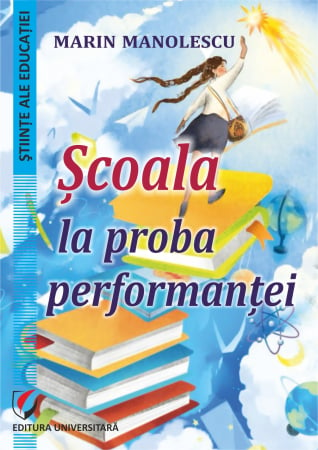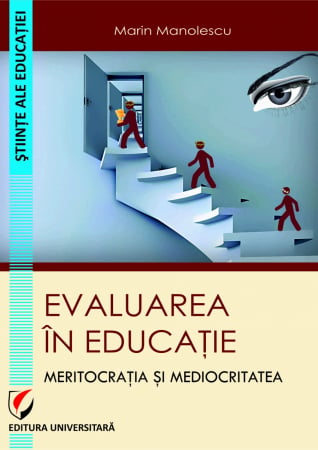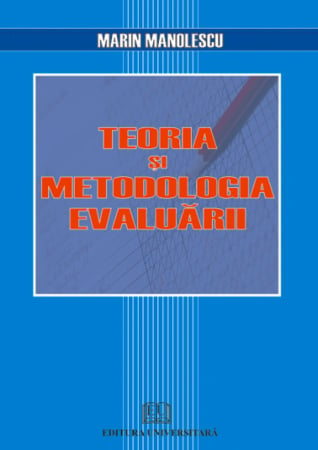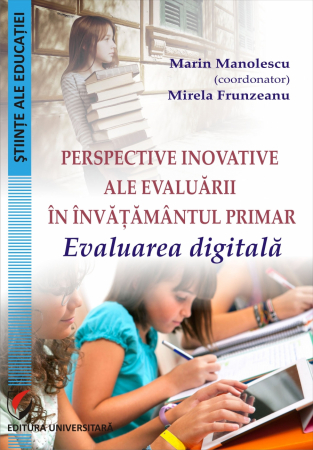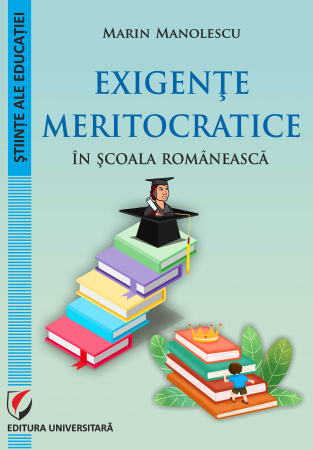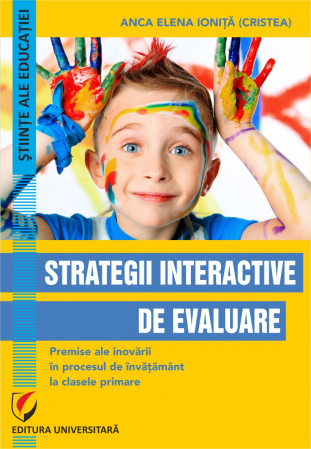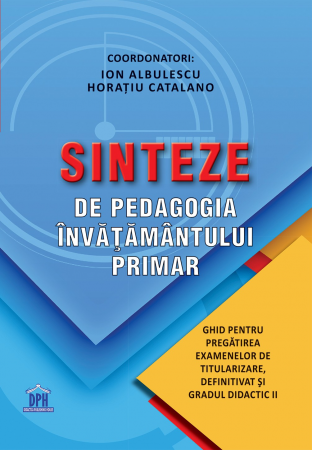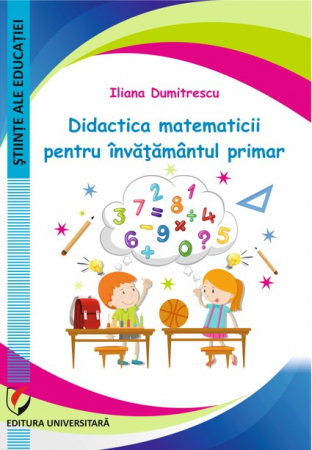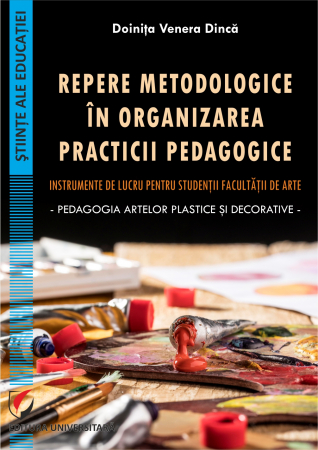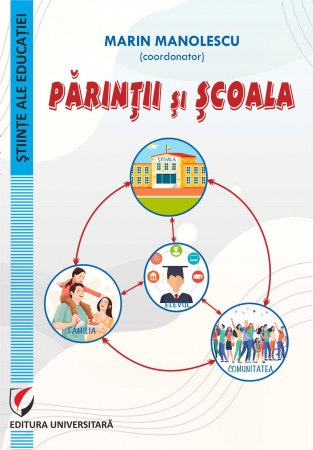Manuscript proposals: [email protected] / 0745 204 115 //// Tracking orders Individuals / Sales: 0745 200 357 / Orders Legal entities: 0721 722 783
ISBN: 978-606-28-0596-8
DOI: 10.5682/9786062805968
Publisher year: 2017
Edition: I
Pages: 196
Publisher: Editura Universitară
Author: Ioana Stancescu
Product Code:
9786062805968
Do you need help?
0745 200 357
- Description
- Download (1)
- Authors
- Content
- More details
- Reviews (0)
The field of research and reflection proposed by the author, Dr. Ioana Stăncescu, is among modern concerns, with a high rate of actuality in the current investigative field of education sciences in Romania and, equally, abroad. Metacognition and motivation, significantly correlated in everything that signifies human learning, especially academic learning, are two of the concepts that have become priority paradigmatic, provocatively epistemological cores for investigations in educational sciences and educational psychology. The centers of interest also aim at the success of the author to define them as clearly as possible at the level of interdisciplinary connections, to discover the pragmatic action valences that they have in the process of increasing the impact coefficient on the quality of conduct and learning results, of the efficiency of academic study.
The economy of the work, one with a chosen invoice of architectural harmony, refers to solid, productive and exciting argumentative foundations for the lecturer who assumes the desire and will to penetrate the structural and functional mechanisms of the mentioned domains. We recognize that none of them is easy to know, to research experimentally and to value institutionally or personally. For a more careful mental understanding of the diversity of the issues examined by the authors, we are tempted to, through an effort to discipline and correlate analytical approaches, harmonized with synthesis ones, to propose and carry out a review of the construction pillars of of the work, to explicitly capture the valences of the main value segments of the work, an exercise practiced by not a few authors and, later, of its global values.
The first part addressed is intended for modern Didactics, unit of cognition, metacognition and motivation. Analyzes focused on concepts, values, mechanisms and supporting theories become central here. The author explores the current state of research of the two conceptual values, analyzes metacognition in the context of academic learning, learning motivation and motivated learning, the vision being that of the foundations of the teacher's reflective practice, focused as a premise on the sustainable development of metacognition in students. The theoretical framework is a comprehensive and solid idea, substantiating the exploratory approach. The ideas are adequately structured, creating a productive synthesis of the most important ideas/concepts with relevance for the researched field. The descriptive analysis perspective of the problem is complemented by a reflective and, critically constructive approach, with the assumption of personal, interesting points of view, generating interest for the need for investigative continuity.
The investigative project of cognitively and metacognitively motivated learning behaviors in students becomes the methodological core of the work, the geometric place of the examinations intended to achieve a modeling approach to research, synthesis of correlations between objectives, variables, hypotheses, research methods and tools.
Among the priority objectives of research in the academic environment, the following should be noted: the investigation of the metacognitive level; identifying the types of motivations; analysis of the connections between metacognition and learning motivation; the study of the differences between students who follow the Psychopedagogical Studies Program and those who do not attend this program; researching the opinions and attitudes of university teaching staff regarding metacognitive skills and student motivation; the identification and practice of strategies for the development of metacognition and motivation in students, validated by the implementation of a metacognitive and motivational training program, the target being the optimization/efficiency of academic learning.
In accordance with the established objectives, the identity of the incorporated variables is revealed, in the statement of the research hypotheses. Expressed synthetically, the statements developed in the text of the paper allow several references. First, the validation of the idea according to which students who systematically and regularly go through the courses of the Psychopedagogical Studies Program show obvious progress in professional conduct, the qualitative achievement of metacognitive skills to a greater extent than students who do not attend this module. Then, the power of the second hypothesis, which aimed at verifying the existence of a high correlation between the metacognitive level and the motivation of learning in students. Thirdly, the value of the ecological validity of the hypothetical statement according to which, in conditions where teachers pay more attention and time to the training and development of metacognitive skills, contribute to the realization of the Metacognitive and Motivational Training Program, and academic learning becomes more effective, the results of students in the sphere professionalization being on the rise.
The researched population/sample consisted of 404 students with diversified specializations, from the Valahia University of Târgovişte, the University of Bucharest and the University of Petroleum and Gas Ploiesti and 20 university teaching staff, with experience in initial and ongoing psychopedagogical training. Among the investigated subjects are both students who follow the Psychopedagogical Studies Program and students who do not follow this module.
The set of main research methods and tools elaborated and/or processed by the authors is relevant: Metacognitive Inventory, Student Questionnaire, Academic Learning Motivation Identification Scale, Motivated Learning Strategies Questionnaire, Focus Group, Metacognitive Training Program Experiment and motivational (PAMM). To these are added statistical methods of analysis and processing, hermeneutic statements/interpretation of the results, with the help of Excel and SPSS programs. Frequently used were the methods of graphical representation of the results: histograms, diagrams, statistical methods and techniques: the calculation of statistical indices (mean, median, mode, standard deviation, minimum and maximum intervals of the scores), calculation of frequencies and percentages, the T test of significance of differences between two environments, etc.
The results obtained in the study of metacognition and motivation involved in academic learning represent the most consistent and original part of the paper. The analysis and interpretation model is centered on the rigorous scientific validation of the results obtained, on iconic and statistical representations, accompanied by nuanced comments and reflections. These define the author, Dr. Ioana Stăncescu, trained researcher, attentive to nuances. The image that the text of the work leaves to the reader is one of good quality. An interesting and useful combination between quantitative research and qualitative research is thus certified.
The significant contributions of the work are revealed by: the concreteness of the identification and the quality of the description of the research variables, the value of the hypotheses subject to verification, the construction and articulation of the research tools used, the quality of the research elements (variables – objective hypotheses – research methods and tools), the processing and interpretation of the results obtained which, under a quantitative and qualitative aspect, confirms the hypotheses formulated and validated quasi-experimentally.
The results obtained reflect the diversity and complexity of the problems addressed, the differential status of the positive correlation between the meta-cognitive and the motivational level, especially for students who follow the Program of psycho-pedagogical studies, of metacognitive training, based on the quality of the statistical processing of the data with the help of the SPSS program. Significant increases in the students' metacognitive capacity were revealed after the training program, the efficiency and positive impact of the investigated activities.
The end of the work written under the sign of the operational value of a Guide of good practices in the metacognitive field, represents another original contribution that the author brings to the promotion and development of the theme. The development and submission to the public exam test of such an operational guide contributes significantly to the practical realization of autonomous, self-regulated learning tasks, making a reasoned contribution to the efforts of experts to support the value of the formative exercise aimed at metacognitive skills, in symbiosis with a positive motivation intrinsic to the study academic. To these is added, of course, the quality of concerns for the style in which we train students, the extent to which both actors want to improve their professionalization efforts, against the background of the harmonization of the quality academic didactic repertoire. Such a guide becomes an important didactic landmark in the organization of the initial and continuous training/training of pre-university teaching staff.
The economy of the work, one with a chosen invoice of architectural harmony, refers to solid, productive and exciting argumentative foundations for the lecturer who assumes the desire and will to penetrate the structural and functional mechanisms of the mentioned domains. We recognize that none of them is easy to know, to research experimentally and to value institutionally or personally. For a more careful mental understanding of the diversity of the issues examined by the authors, we are tempted to, through an effort to discipline and correlate analytical approaches, harmonized with synthesis ones, to propose and carry out a review of the construction pillars of of the work, to explicitly capture the valences of the main value segments of the work, an exercise practiced by not a few authors and, later, of its global values.
The first part addressed is intended for modern Didactics, unit of cognition, metacognition and motivation. Analyzes focused on concepts, values, mechanisms and supporting theories become central here. The author explores the current state of research of the two conceptual values, analyzes metacognition in the context of academic learning, learning motivation and motivated learning, the vision being that of the foundations of the teacher's reflective practice, focused as a premise on the sustainable development of metacognition in students. The theoretical framework is a comprehensive and solid idea, substantiating the exploratory approach. The ideas are adequately structured, creating a productive synthesis of the most important ideas/concepts with relevance for the researched field. The descriptive analysis perspective of the problem is complemented by a reflective and, critically constructive approach, with the assumption of personal, interesting points of view, generating interest for the need for investigative continuity.
The investigative project of cognitively and metacognitively motivated learning behaviors in students becomes the methodological core of the work, the geometric place of the examinations intended to achieve a modeling approach to research, synthesis of correlations between objectives, variables, hypotheses, research methods and tools.
Among the priority objectives of research in the academic environment, the following should be noted: the investigation of the metacognitive level; identifying the types of motivations; analysis of the connections between metacognition and learning motivation; the study of the differences between students who follow the Psychopedagogical Studies Program and those who do not attend this program; researching the opinions and attitudes of university teaching staff regarding metacognitive skills and student motivation; the identification and practice of strategies for the development of metacognition and motivation in students, validated by the implementation of a metacognitive and motivational training program, the target being the optimization/efficiency of academic learning.
In accordance with the established objectives, the identity of the incorporated variables is revealed, in the statement of the research hypotheses. Expressed synthetically, the statements developed in the text of the paper allow several references. First, the validation of the idea according to which students who systematically and regularly go through the courses of the Psychopedagogical Studies Program show obvious progress in professional conduct, the qualitative achievement of metacognitive skills to a greater extent than students who do not attend this module. Then, the power of the second hypothesis, which aimed at verifying the existence of a high correlation between the metacognitive level and the motivation of learning in students. Thirdly, the value of the ecological validity of the hypothetical statement according to which, in conditions where teachers pay more attention and time to the training and development of metacognitive skills, contribute to the realization of the Metacognitive and Motivational Training Program, and academic learning becomes more effective, the results of students in the sphere professionalization being on the rise.
The researched population/sample consisted of 404 students with diversified specializations, from the Valahia University of Târgovişte, the University of Bucharest and the University of Petroleum and Gas Ploiesti and 20 university teaching staff, with experience in initial and ongoing psychopedagogical training. Among the investigated subjects are both students who follow the Psychopedagogical Studies Program and students who do not follow this module.
The set of main research methods and tools elaborated and/or processed by the authors is relevant: Metacognitive Inventory, Student Questionnaire, Academic Learning Motivation Identification Scale, Motivated Learning Strategies Questionnaire, Focus Group, Metacognitive Training Program Experiment and motivational (PAMM). To these are added statistical methods of analysis and processing, hermeneutic statements/interpretation of the results, with the help of Excel and SPSS programs. Frequently used were the methods of graphical representation of the results: histograms, diagrams, statistical methods and techniques: the calculation of statistical indices (mean, median, mode, standard deviation, minimum and maximum intervals of the scores), calculation of frequencies and percentages, the T test of significance of differences between two environments, etc.
The results obtained in the study of metacognition and motivation involved in academic learning represent the most consistent and original part of the paper. The analysis and interpretation model is centered on the rigorous scientific validation of the results obtained, on iconic and statistical representations, accompanied by nuanced comments and reflections. These define the author, Dr. Ioana Stăncescu, trained researcher, attentive to nuances. The image that the text of the work leaves to the reader is one of good quality. An interesting and useful combination between quantitative research and qualitative research is thus certified.
The significant contributions of the work are revealed by: the concreteness of the identification and the quality of the description of the research variables, the value of the hypotheses subject to verification, the construction and articulation of the research tools used, the quality of the research elements (variables – objective hypotheses – research methods and tools), the processing and interpretation of the results obtained which, under a quantitative and qualitative aspect, confirms the hypotheses formulated and validated quasi-experimentally.
The results obtained reflect the diversity and complexity of the problems addressed, the differential status of the positive correlation between the meta-cognitive and the motivational level, especially for students who follow the Program of psycho-pedagogical studies, of metacognitive training, based on the quality of the statistical processing of the data with the help of the SPSS program. Significant increases in the students' metacognitive capacity were revealed after the training program, the efficiency and positive impact of the investigated activities.
The end of the work written under the sign of the operational value of a Guide of good practices in the metacognitive field, represents another original contribution that the author brings to the promotion and development of the theme. The development and submission to the public exam test of such an operational guide contributes significantly to the practical realization of autonomous, self-regulated learning tasks, making a reasoned contribution to the efforts of experts to support the value of the formative exercise aimed at metacognitive skills, in symbiosis with a positive motivation intrinsic to the study academic. To these is added, of course, the quality of concerns for the style in which we train students, the extent to which both actors want to improve their professionalization efforts, against the background of the harmonization of the quality academic didactic repertoire. Such a guide becomes an important didactic landmark in the organization of the initial and continuous training/training of pre-university teaching staff.
-
Metacognitie si motivatie in invatarea academica. Repere psihodidactice
Download

IOANA STANCESCU is a PhD assistant in the Department for Teaching Staff Training, at the Valahia University in Targovite.
She is a graduate of the Faculty of Psychology and Educational Sciences, Specialization in Pedagogy, University of Bucharest (2006) and the Master's Degree in Management and Educational Evaluation from the same faculty (2008). He obtained the title of doctor in the field of Educational Sciences at the University of Bucharest (2011).
Holds seminar activities for the Fundamentals of Pedagogy subjects. Theory and methodology of the curriculum, Theory and methodology of training. Evaluation theory and methodology, Student class management. She is an accredited trainer in several continuous training programs for teaching staff in pre-university education.
Among his topics of scientific interest are: metacognition, effective learning, learning motivation, teacher's reflective behavior, interactive didactic strategies, evaluation in the didactic process, intercultural education, non-formal education.
Co-author of specialized works and university courses: Management of the class of students (2014), Theory and methodology of training. Evaluation theory and methodology (2014), Education and professional development (2011), Good practice guide (2009), Highlights of increasing the quality of education in the rural environment (2008); author and co-author of numerous scientific articles (published both in the country and abroad), among which we mention: A Science Teachers Perspective Related to Students Motivation for Learning (2016), Considerations on teachers discriminatory practices (2014), Management of change through development metacognition in students (2010), The role of metacognition in academic learning (2010), Metacognition and learning styles (2008).
She is a graduate of the Faculty of Psychology and Educational Sciences, Specialization in Pedagogy, University of Bucharest (2006) and the Master's Degree in Management and Educational Evaluation from the same faculty (2008). He obtained the title of doctor in the field of Educational Sciences at the University of Bucharest (2011).
Holds seminar activities for the Fundamentals of Pedagogy subjects. Theory and methodology of the curriculum, Theory and methodology of training. Evaluation theory and methodology, Student class management. She is an accredited trainer in several continuous training programs for teaching staff in pre-university education.
Among his topics of scientific interest are: metacognition, effective learning, learning motivation, teacher's reflective behavior, interactive didactic strategies, evaluation in the didactic process, intercultural education, non-formal education.
Co-author of specialized works and university courses: Management of the class of students (2014), Theory and methodology of training. Evaluation theory and methodology (2014), Education and professional development (2011), Good practice guide (2009), Highlights of increasing the quality of education in the rural environment (2008); author and co-author of numerous scientific articles (published both in the country and abroad), among which we mention: A Science Teachers Perspective Related to Students Motivation for Learning (2016), Considerations on teachers discriminatory practices (2014), Management of change through development metacognition in students (2010), The role of metacognition in academic learning (2010), Metacognition and learning styles (2008).
ACRONYMS / 8
LIST OF FIGURES / 8
LIST OF TABLES / 10
IDEATIC RECONSTRUCTIONS IN ACADEMIC LEARNING - METACOGNITION AND MOTIVATION, Prof. Univ. emeritus Dr. Ioan Neacșu / 13
ARGUMENT / 17
CHAPTER I. MODERN TEACHING – UNIT OF COGNITION, METACOGNITION AND MOTIVATION. CONCEPTS. VALUES. MECHANISMS. THEORIES. APPLICATIONS / 21
1. Metacognition - core of academic learning / 21
1.1. Learning and learning styles in students / 21
1.2. Metacognition studies and theoretical approaches / 30
1.3. A possible functional structure of metacognition / 32
1.4. Metacognitive models in learning - beyond potentiality / 35
1.5. Cognition metacognition relationship / 37
1.6. Meaningful relationships between metacognition and motivation / 38
1.7. Metacognition in education - applications / 41
1.7.1. Metacognition – generative structure within mathematical and reading activities / 41
1.7.2. Metacognition and academic study in students / 46
1.8. The experimental study of metacognition. Tools and techniques for investigating values and limits / 47
2. Learning motivation - a multifaceted reality, with multiple challenges / 54
2.1. Concept, forms, functional mechanisms / 54
2.2. Explanatory theories and models of motivation in the school environment / 56
2.3. Strategies for motivating students in learning activities / 60
3. The reflective practice of the teacher and the development of metacognition in students / 61
CHAPTER II. THE INVESTIGATIVE PROJECT OF COGNITIVE AND METACOGNITIVE LEARNING IN STUDENTS / 68
1. Open questions in the study of the problem / 68
2. The purpose and objectives of the research / 68
3. Research variables / 69
4. Research hypotheses / 70
5. Investigated population. Features / 70
6. Temporal approach to research Gantt chart / 71
7. Research methods and tools / 72
7.1. The metacognitive inventory / 72
7.2. Questionnaire for students / 75
7.3. Motivation identification scale for academic learning / 83
7.4. Motivated learning strategies questionnaire / 85
7.5. The focus group for university teachers / 90
7.6. Experiment with formative potential: Metacognitive and motivational training program for students (PAMM) / 92
7.7. Statistical methods of collecting, processing and interpreting the results / 98
CHAPTER III. RESULTS - ANALYSIS, INTERPRETATIONS, COMMENTS / 99
1. Metacognition and academic learning: knowledge and regulation / 99
1.1. Metacognition – global analysis / 99
1.2. Metacognition – analysis at the component level / 107
1.2.1. Metacognitive knowledge / 107
1.2.2. Metacognitive regulation / 113
1.2.2.1. Metacognitive strategies / 114
1.2.2.2. Emotion management strategies / 123
1.2.3. Correlation cognitive knowledge - cognitive regulation / 126
1.3. Academic learning / 129
1.4. Promotion strategies and metacognitive development in students / 132
2. Academic learning motivation among students: from extrinsic to intrinsic / 134
2.1. Motivation – global analysis / 134
2.2. Motivation – analysis at the component level / 138
2.2.1. Extrinsic motivation / 138
2.2.2. Intrinsic motivation / 140
3. Metacognition - motivation correlation in academic learning / 142
4. The metacognitive and motivational training program for students - interpretive syntheses / 146
5. The impact and limits of the research / 158
CHAPTER IV. CONCLUSIONS. GOOD PRACTICE GUIDELINES IN THE METACOGNITIVE FIELD OF MOTIVATING STUDENTS / 160
BIBLIOGRAPHY / 178
ANNEXES / 185
Appendix 1 – PAMM reflection sheet / 185
Appendix 2 – Sheet no. 1 - PAMM / 186
Appendix 3 – Sheet no. 2 - PAMM / 188
Appendix 4 – Sheet no. 3 - PAMM / 189
Appendix 5 – Sheet no. 4 - PAMM / 192
Appendix 6 – Sheet no. 5 - PAMM / 194
Appendix 7 – Sheet no. 6 - Matrix SEM PAMM / 195
Appendix 8 – Research matrix / 196
LIST OF FIGURES / 8
LIST OF TABLES / 10
IDEATIC RECONSTRUCTIONS IN ACADEMIC LEARNING - METACOGNITION AND MOTIVATION, Prof. Univ. emeritus Dr. Ioan Neacșu / 13
ARGUMENT / 17
CHAPTER I. MODERN TEACHING – UNIT OF COGNITION, METACOGNITION AND MOTIVATION. CONCEPTS. VALUES. MECHANISMS. THEORIES. APPLICATIONS / 21
1. Metacognition - core of academic learning / 21
1.1. Learning and learning styles in students / 21
1.2. Metacognition studies and theoretical approaches / 30
1.3. A possible functional structure of metacognition / 32
1.4. Metacognitive models in learning - beyond potentiality / 35
1.5. Cognition metacognition relationship / 37
1.6. Meaningful relationships between metacognition and motivation / 38
1.7. Metacognition in education - applications / 41
1.7.1. Metacognition – generative structure within mathematical and reading activities / 41
1.7.2. Metacognition and academic study in students / 46
1.8. The experimental study of metacognition. Tools and techniques for investigating values and limits / 47
2. Learning motivation - a multifaceted reality, with multiple challenges / 54
2.1. Concept, forms, functional mechanisms / 54
2.2. Explanatory theories and models of motivation in the school environment / 56
2.3. Strategies for motivating students in learning activities / 60
3. The reflective practice of the teacher and the development of metacognition in students / 61
CHAPTER II. THE INVESTIGATIVE PROJECT OF COGNITIVE AND METACOGNITIVE LEARNING IN STUDENTS / 68
1. Open questions in the study of the problem / 68
2. The purpose and objectives of the research / 68
3. Research variables / 69
4. Research hypotheses / 70
5. Investigated population. Features / 70
6. Temporal approach to research Gantt chart / 71
7. Research methods and tools / 72
7.1. The metacognitive inventory / 72
7.2. Questionnaire for students / 75
7.3. Motivation identification scale for academic learning / 83
7.4. Motivated learning strategies questionnaire / 85
7.5. The focus group for university teachers / 90
7.6. Experiment with formative potential: Metacognitive and motivational training program for students (PAMM) / 92
7.7. Statistical methods of collecting, processing and interpreting the results / 98
CHAPTER III. RESULTS - ANALYSIS, INTERPRETATIONS, COMMENTS / 99
1. Metacognition and academic learning: knowledge and regulation / 99
1.1. Metacognition – global analysis / 99
1.2. Metacognition – analysis at the component level / 107
1.2.1. Metacognitive knowledge / 107
1.2.2. Metacognitive regulation / 113
1.2.2.1. Metacognitive strategies / 114
1.2.2.2. Emotion management strategies / 123
1.2.3. Correlation cognitive knowledge - cognitive regulation / 126
1.3. Academic learning / 129
1.4. Promotion strategies and metacognitive development in students / 132
2. Academic learning motivation among students: from extrinsic to intrinsic / 134
2.1. Motivation – global analysis / 134
2.2. Motivation – analysis at the component level / 138
2.2.1. Extrinsic motivation / 138
2.2.2. Intrinsic motivation / 140
3. Metacognition - motivation correlation in academic learning / 142
4. The metacognitive and motivational training program for students - interpretive syntheses / 146
5. The impact and limits of the research / 158
CHAPTER IV. CONCLUSIONS. GOOD PRACTICE GUIDELINES IN THE METACOGNITIVE FIELD OF MOTIVATING STUDENTS / 160
BIBLIOGRAPHY / 178
ANNEXES / 185
Appendix 1 – PAMM reflection sheet / 185
Appendix 2 – Sheet no. 1 - PAMM / 186
Appendix 3 – Sheet no. 2 - PAMM / 188
Appendix 4 – Sheet no. 3 - PAMM / 189
Appendix 5 – Sheet no. 4 - PAMM / 192
Appendix 6 – Sheet no. 5 - PAMM / 194
Appendix 7 – Sheet no. 6 - Matrix SEM PAMM / 195
Appendix 8 – Research matrix / 196
The field of research and reflection proposed by the author, Dr. Ioana Stăncescu, is among modern concerns, with a high rate of actuality in the current investigative field of education sciences in Romania and, equally, abroad. Metacognition and motivation, significantly correlated in everything that signifies human learning, especially academic learning, are two of the concepts that have become priority paradigmatic, provocatively epistemological cores for investigations in educational sciences and educational psychology. The centers of interest also aim at the success of the author to define them as clearly as possible at the level of interdisciplinary connections, to discover the pragmatic action valences that they have in the process of increasing the impact coefficient on the quality of conduct and learning results, of the efficiency of academic study.
The economy of the work, one with a chosen invoice of architectural harmony, refers to solid, productive and exciting argumentative foundations for the lecturer who assumes the desire and will to penetrate the structural and functional mechanisms of the mentioned domains. We recognize that none of them is easy to know, to research experimentally and to value institutionally or personally. For a more careful mental understanding of the diversity of the issues examined by the authors, we are tempted to, through an effort to discipline and correlate analytical approaches, harmonized with synthesis ones, to propose and carry out a review of the construction pillars of of the work, to explicitly capture the valences of the main value segments of the work, an exercise practiced by not a few authors and, later, of its global values.
The first part addressed is intended for modern Didactics, unit of cognition, metacognition and motivation. Analyzes focused on concepts, values, mechanisms and supporting theories become central here. The author explores the current state of research of the two conceptual values, analyzes metacognition in the context of academic learning, learning motivation and motivated learning, the vision being that of the foundations of the teacher's reflective practice, focused as a premise on the sustainable development of metacognition in students. The theoretical framework is a comprehensive and solid idea, substantiating the exploratory approach. The ideas are adequately structured, creating a productive synthesis of the most important ideas/concepts with relevance for the researched field. The descriptive analysis perspective of the problem is complemented by a reflective and, critically constructive approach, with the assumption of personal, interesting points of view, generating interest for the need for investigative continuity.
The investigative project of cognitively and metacognitively motivated learning behaviors in students becomes the methodological core of the work, the geometric place of the examinations intended to achieve a modeling approach to research, synthesis of correlations between objectives, variables, hypotheses, research methods and tools.
Among the priority objectives of research in the academic environment, the following should be noted: the investigation of the metacognitive level; identifying the types of motivations; analysis of the connections between metacognition and learning motivation; the study of the differences between students who follow the Psychopedagogical Studies Program and those who do not attend this program; researching the opinions and attitudes of university teaching staff regarding metacognitive skills and student motivation; the identification and practice of strategies for the development of metacognition and motivation in students, validated by the implementation of a metacognitive and motivational training program, the target being the optimization/efficiency of academic learning.
In accordance with the established objectives, the identity of the incorporated variables is revealed, in the statement of the research hypotheses. Expressed synthetically, the statements developed in the text of the paper allow several references. First, the validation of the idea according to which students who systematically and regularly go through the courses of the Psychopedagogical Studies Program show obvious progress in professional conduct, the qualitative achievement of metacognitive skills to a greater extent than students who do not attend this module. Then, the power of the second hypothesis, which aimed at verifying the existence of a high correlation between the metacognitive level and the motivation of learning in students. Thirdly, the value of the ecological validity of the hypothetical statement according to which, in conditions where teachers pay more attention and time to the training and development of metacognitive skills, contribute to the realization of the Metacognitive and Motivational Training Program, and academic learning becomes more effective, the results of students in the sphere professionalization being on the rise.
The researched population/sample consisted of 404 students with diversified specializations, from the Valahia University of Târgovişte, the University of Bucharest and the University of Petroleum and Gas Ploiesti and 20 university teaching staff, with experience in initial and ongoing psychopedagogical training. Among the investigated subjects are both students who follow the Psychopedagogical Studies Program and students who do not follow this module.
The set of main research methods and tools elaborated and/or processed by the authors is relevant: Metacognitive Inventory, Student Questionnaire, Academic Learning Motivation Identification Scale, Motivated Learning Strategies Questionnaire, Focus Group, Metacognitive Training Program Experiment and motivational (PAMM). To these are added statistical methods of analysis and processing, hermeneutic statements/interpretation of the results, with the help of Excel and SPSS programs. Frequently used were the methods of graphical representation of the results: histograms, diagrams, statistical methods and techniques: the calculation of statistical indices (mean, median, mode, standard deviation, minimum and maximum intervals of the scores), calculation of frequencies and percentages, the T test of significance of differences between two environments, etc.
The results obtained in the study of metacognition and motivation involved in academic learning represent the most consistent and original part of the paper. The analysis and interpretation model is centered on the rigorous scientific validation of the results obtained, on iconic and statistical representations, accompanied by nuanced comments and reflections. These define the author, Dr. Ioana Stăncescu, trained researcher, attentive to nuances. The image that the text of the work leaves to the reader is one of good quality. An interesting and useful combination between quantitative research and qualitative research is thus certified.
The significant contributions of the work are revealed by: the concreteness of the identification and the quality of the description of the research variables, the value of the hypotheses subject to verification, the construction and articulation of the research tools used, the quality of the research elements (variables – objective hypotheses – research methods and tools), the processing and interpretation of the results obtained which, under a quantitative and qualitative aspect, confirms the hypotheses formulated and validated quasi-experimentally.
The results obtained reflect the diversity and complexity of the problems addressed, the differential status of the positive correlation between the meta-cognitive and the motivational level, especially for students who follow the Program of psycho-pedagogical studies, of metacognitive training, based on the quality of the statistical processing of the data with the help of the SPSS program. Significant increases in the students' metacognitive capacity were revealed after the training program, the efficiency and positive impact of the investigated activities.
The end of the work written under the sign of the operational value of a Guide of good practices in the metacognitive field, represents another original contribution that the author brings to the promotion and development of the theme. The development and submission to the public exam test of such an operational guide contributes significantly to the practical realization of autonomous, self-regulated learning tasks, making a reasoned contribution to the efforts of experts to support the value of the formative exercise aimed at metacognitive skills, in symbiosis with a positive motivation intrinsic to the study academic. To these is added, of course, the quality of concerns for the style in which we train students, the extent to which both actors want to improve their professionalization efforts, against the background of the harmonization of the quality academic didactic repertoire. Such a guide becomes an important didactic landmark in the organization of the initial and continuous training/training of pre-university teaching staff.
The work has solid theoretical-methodological foundations, a proof being the wide spectrum of the utilized bibliography, with relevant references to works from foreign literature, as well as from the Romanian one.
With a well-defined status, the work confirms the substance of the intentionality of the investigative approach, the progress and the certainties that one of the meritorious graduates of the Doctoral School of Psychology and Educational Sciences of the University of Bucharest, Mrs. Dr. Ioana Stăncescu, whom I coordinated. In a broader perspective, we feel the results of joint scientific work, the strength and motivation aimed at ensuring the constructive premises necessary to increase the potential of affirming the field of education sciences at other universities, such as Valahia University in Târgovişte, where it works beautifully and is currently integrated excellent colleague. This author's work, which we examine here and warmly recommend, has every chance of becoming a significant contribution to the specialized bibliography. We wish him the success deserved and expected by us, the academic community, his colleagues in the department, his students and more.
Bucharest, March 2017
Univ. Prof. emeritus Dr. Ioan Neacșu
Faculty of Psychology and Educational Sciences,
University of Bucharest
The economy of the work, one with a chosen invoice of architectural harmony, refers to solid, productive and exciting argumentative foundations for the lecturer who assumes the desire and will to penetrate the structural and functional mechanisms of the mentioned domains. We recognize that none of them is easy to know, to research experimentally and to value institutionally or personally. For a more careful mental understanding of the diversity of the issues examined by the authors, we are tempted to, through an effort to discipline and correlate analytical approaches, harmonized with synthesis ones, to propose and carry out a review of the construction pillars of of the work, to explicitly capture the valences of the main value segments of the work, an exercise practiced by not a few authors and, later, of its global values.
The first part addressed is intended for modern Didactics, unit of cognition, metacognition and motivation. Analyzes focused on concepts, values, mechanisms and supporting theories become central here. The author explores the current state of research of the two conceptual values, analyzes metacognition in the context of academic learning, learning motivation and motivated learning, the vision being that of the foundations of the teacher's reflective practice, focused as a premise on the sustainable development of metacognition in students. The theoretical framework is a comprehensive and solid idea, substantiating the exploratory approach. The ideas are adequately structured, creating a productive synthesis of the most important ideas/concepts with relevance for the researched field. The descriptive analysis perspective of the problem is complemented by a reflective and, critically constructive approach, with the assumption of personal, interesting points of view, generating interest for the need for investigative continuity.
The investigative project of cognitively and metacognitively motivated learning behaviors in students becomes the methodological core of the work, the geometric place of the examinations intended to achieve a modeling approach to research, synthesis of correlations between objectives, variables, hypotheses, research methods and tools.
Among the priority objectives of research in the academic environment, the following should be noted: the investigation of the metacognitive level; identifying the types of motivations; analysis of the connections between metacognition and learning motivation; the study of the differences between students who follow the Psychopedagogical Studies Program and those who do not attend this program; researching the opinions and attitudes of university teaching staff regarding metacognitive skills and student motivation; the identification and practice of strategies for the development of metacognition and motivation in students, validated by the implementation of a metacognitive and motivational training program, the target being the optimization/efficiency of academic learning.
In accordance with the established objectives, the identity of the incorporated variables is revealed, in the statement of the research hypotheses. Expressed synthetically, the statements developed in the text of the paper allow several references. First, the validation of the idea according to which students who systematically and regularly go through the courses of the Psychopedagogical Studies Program show obvious progress in professional conduct, the qualitative achievement of metacognitive skills to a greater extent than students who do not attend this module. Then, the power of the second hypothesis, which aimed at verifying the existence of a high correlation between the metacognitive level and the motivation of learning in students. Thirdly, the value of the ecological validity of the hypothetical statement according to which, in conditions where teachers pay more attention and time to the training and development of metacognitive skills, contribute to the realization of the Metacognitive and Motivational Training Program, and academic learning becomes more effective, the results of students in the sphere professionalization being on the rise.
The researched population/sample consisted of 404 students with diversified specializations, from the Valahia University of Târgovişte, the University of Bucharest and the University of Petroleum and Gas Ploiesti and 20 university teaching staff, with experience in initial and ongoing psychopedagogical training. Among the investigated subjects are both students who follow the Psychopedagogical Studies Program and students who do not follow this module.
The set of main research methods and tools elaborated and/or processed by the authors is relevant: Metacognitive Inventory, Student Questionnaire, Academic Learning Motivation Identification Scale, Motivated Learning Strategies Questionnaire, Focus Group, Metacognitive Training Program Experiment and motivational (PAMM). To these are added statistical methods of analysis and processing, hermeneutic statements/interpretation of the results, with the help of Excel and SPSS programs. Frequently used were the methods of graphical representation of the results: histograms, diagrams, statistical methods and techniques: the calculation of statistical indices (mean, median, mode, standard deviation, minimum and maximum intervals of the scores), calculation of frequencies and percentages, the T test of significance of differences between two environments, etc.
The results obtained in the study of metacognition and motivation involved in academic learning represent the most consistent and original part of the paper. The analysis and interpretation model is centered on the rigorous scientific validation of the results obtained, on iconic and statistical representations, accompanied by nuanced comments and reflections. These define the author, Dr. Ioana Stăncescu, trained researcher, attentive to nuances. The image that the text of the work leaves to the reader is one of good quality. An interesting and useful combination between quantitative research and qualitative research is thus certified.
The significant contributions of the work are revealed by: the concreteness of the identification and the quality of the description of the research variables, the value of the hypotheses subject to verification, the construction and articulation of the research tools used, the quality of the research elements (variables – objective hypotheses – research methods and tools), the processing and interpretation of the results obtained which, under a quantitative and qualitative aspect, confirms the hypotheses formulated and validated quasi-experimentally.
The results obtained reflect the diversity and complexity of the problems addressed, the differential status of the positive correlation between the meta-cognitive and the motivational level, especially for students who follow the Program of psycho-pedagogical studies, of metacognitive training, based on the quality of the statistical processing of the data with the help of the SPSS program. Significant increases in the students' metacognitive capacity were revealed after the training program, the efficiency and positive impact of the investigated activities.
The end of the work written under the sign of the operational value of a Guide of good practices in the metacognitive field, represents another original contribution that the author brings to the promotion and development of the theme. The development and submission to the public exam test of such an operational guide contributes significantly to the practical realization of autonomous, self-regulated learning tasks, making a reasoned contribution to the efforts of experts to support the value of the formative exercise aimed at metacognitive skills, in symbiosis with a positive motivation intrinsic to the study academic. To these is added, of course, the quality of concerns for the style in which we train students, the extent to which both actors want to improve their professionalization efforts, against the background of the harmonization of the quality academic didactic repertoire. Such a guide becomes an important didactic landmark in the organization of the initial and continuous training/training of pre-university teaching staff.
The work has solid theoretical-methodological foundations, a proof being the wide spectrum of the utilized bibliography, with relevant references to works from foreign literature, as well as from the Romanian one.
With a well-defined status, the work confirms the substance of the intentionality of the investigative approach, the progress and the certainties that one of the meritorious graduates of the Doctoral School of Psychology and Educational Sciences of the University of Bucharest, Mrs. Dr. Ioana Stăncescu, whom I coordinated. In a broader perspective, we feel the results of joint scientific work, the strength and motivation aimed at ensuring the constructive premises necessary to increase the potential of affirming the field of education sciences at other universities, such as Valahia University in Târgovişte, where it works beautifully and is currently integrated excellent colleague. This author's work, which we examine here and warmly recommend, has every chance of becoming a significant contribution to the specialized bibliography. We wish him the success deserved and expected by us, the academic community, his colleagues in the department, his students and more.
Bucharest, March 2017
Univ. Prof. emeritus Dr. Ioan Neacșu
Faculty of Psychology and Educational Sciences,
University of Bucharest
If you want to express your opinion about this product you can add a review.
write a review

6359.png)
![Metacognition and motivation in academic learning. Psychodidactic landmarks - Ioana Stancescu [0] Metacognition and motivation in academic learning. Psychodidactic landmarks - Ioana Stancescu [0]](https://gomagcdn.ro/domains/editurauniversitara.ro/files/product/medium/metacognitie-si-motivatie-in-invatarea-academica-repere-psihodidactice-428-638411.jpg)
![Metacognition and motivation in academic learning. Psychodidactic landmarks - Ioana Stancescu [1] Metacognition and motivation in academic learning. Psychodidactic landmarks - Ioana Stancescu [1]](https://gomagcdn.ro/domains/editurauniversitara.ro/files/product/medium/metacognitie-si-motivatie-in-invatarea-academica-repere-psihodidactice-ioana-stancescu-004312.jpg)
![Metacognition and motivation in academic learning. Psychodidactic landmarks - Ioana Stancescu [1] Metacognition and motivation in academic learning. Psychodidactic landmarks - Ioana Stancescu [1]](https://gomagcdn.ro/domains/editurauniversitara.ro/files/product/large/metacognitie-si-motivatie-in-invatarea-academica-repere-psihodidactice-428-638411.jpg)
![Metacognition and motivation in academic learning. Psychodidactic landmarks - Ioana Stancescu [2] Metacognition and motivation in academic learning. Psychodidactic landmarks - Ioana Stancescu [2]](https://gomagcdn.ro/domains/editurauniversitara.ro/files/product/large/metacognitie-si-motivatie-in-invatarea-academica-repere-psihodidactice-ioana-stancescu-004312.jpg)
